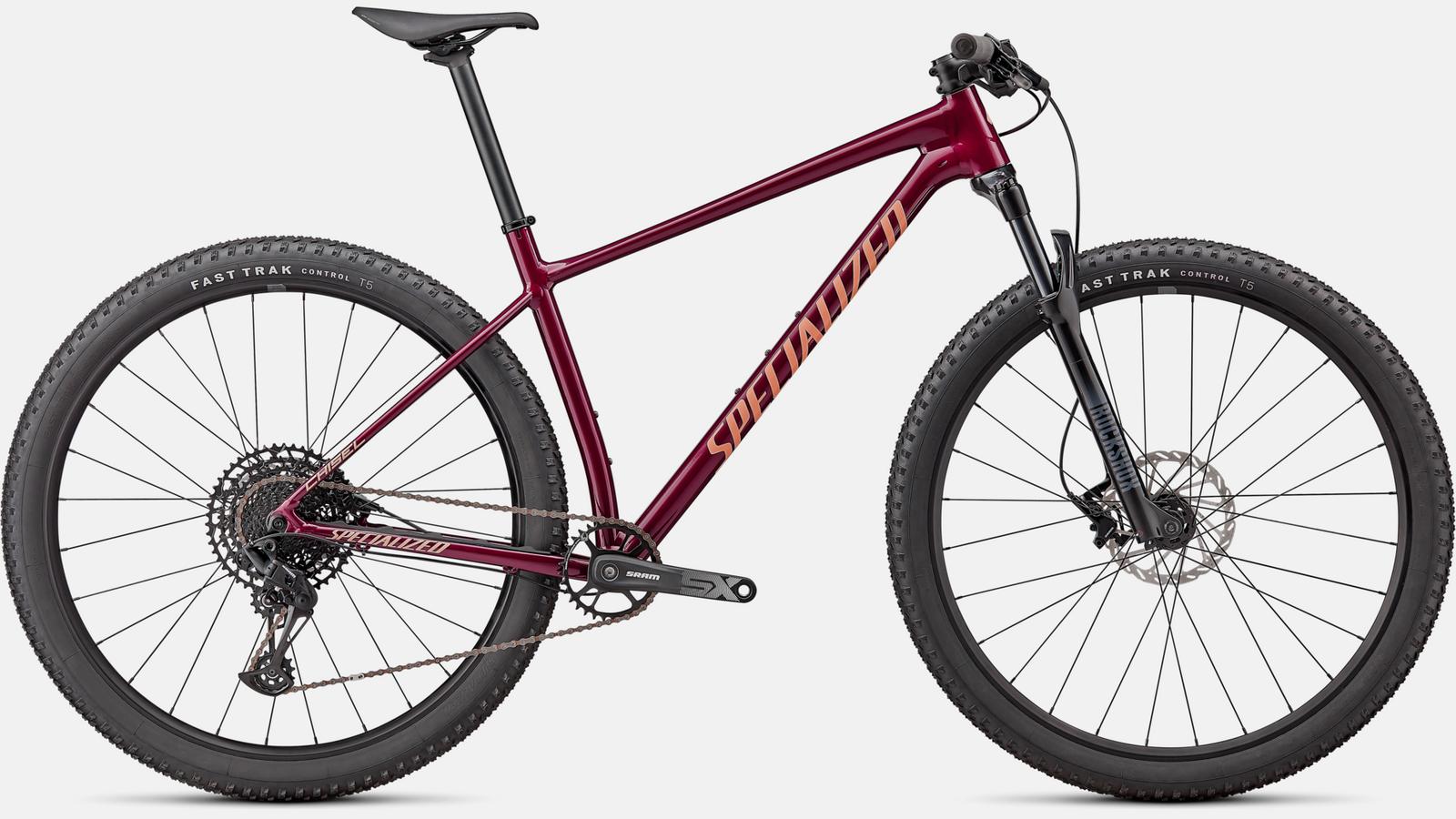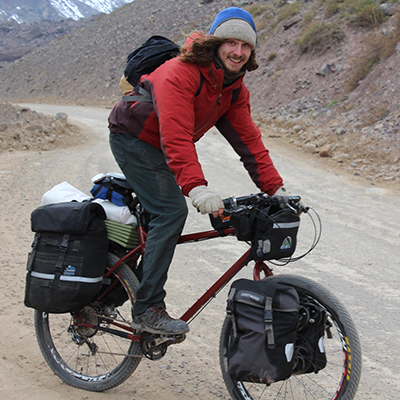13 Best Hardtail Mountain Bikes of 2025 for Beginners Mountain Biking Enthusiasts
Hardtail mountain bikes are bikes that have front suspension only and no rear suspension.
Hardtails have numerous benefits compared to dual-suspension bikes, as they typically weigh less, cost less, are easier to maintain, and last longer. That makes them popular among a broader range of riders, especially with beginners.
Hardtail mountain bikes are also more efficient while pedaling, as the power is transferred directly from the pedals to the rear wheel, without squishy rear suspension in between.
Moreover, if you’re a beginner, you can improve your skills and technique faster on a hardtail before upgrading to a more forgiving and capable full-suspension bike.
In this article, we’ll show you a roundup of some of the best hardtail mountain bikes available in 2025 and explain what you need to consider when buying to get the best deal.
What to Consider When Buying a Hardtail Mountain Bike?
When entering the world of mountain biking and looking for the best hardtail mountain bike for your needs, there are several key factors to consider.
From the type of frame to the specifics of the components, here’s a quick breakdown of what you need to keep in mind.
Hardtail vs. Full Suspension Frame Differences
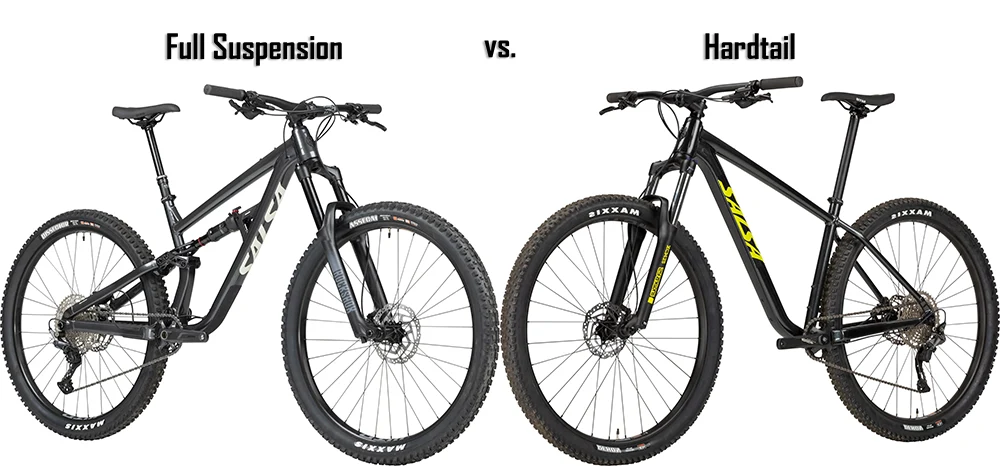
Both full suspension and hardtail mountain bikes have strengths and weaknesses and can be the right choice for certain types of riders.
Are you wondering whether to buy a hardtail or a full-suspension bike? Well, either can be a good choice depending on your needs, budget, and personal preference.
Hardtail mountain bikes have a rigid rear end, so they provide a more direct transfer of power from the pedals to the drivetrain and they are lighter. This makes them great for climbing and long days in the saddle.
Get a hardtail if you climb a lot and ride on tamer trails and dirt roads, but get a full-suspension mountain bike if your goal is to ride on rougher, more technical terrain.
In contrast, full-suspension mountain bikes are more forgiving for beginner cyclists because they provide better control and comfort on rough terrain. If you make a lot of mistakes as a novice mountain biker, they won’t punish you as much as a hardtail will. But they are more expensive, so you typically get lower-quality components for the same amount of money compared to a hardtail.
So, choosing between the two boils down to your style of riding: get a hardtail if you climb a lot and ride on tamer trails and dirt roads, but get a full-suspension mountain bike if your goal is to ride on rougher, more technical terrain.
Budget and Value for Money
Buying a hardtail mountain bike is the most affordable way to enter the world of mountain biking.
If you’re looking to buy a mountain bike under $2,000, we recommend getting a hardtail mountain bike. You’ll get a well-built mid-range model that comes with quality components and a durable aluminum frame. Add another grand and you can even get a carbon frame with even better components.
Comparatively, full-suspension mountain bikes under $2,000 typically come with an aluminum frame and entry-level components, so you get less value for your money. But if you look at full-suspension mountain bikes under $3,000 or slightly above, you will still get an aluminum frame with slightly better components.
Of course, the price also depends on the manufacturers, but a hardtail typically offers more bang for the buck.
Suspension Fork
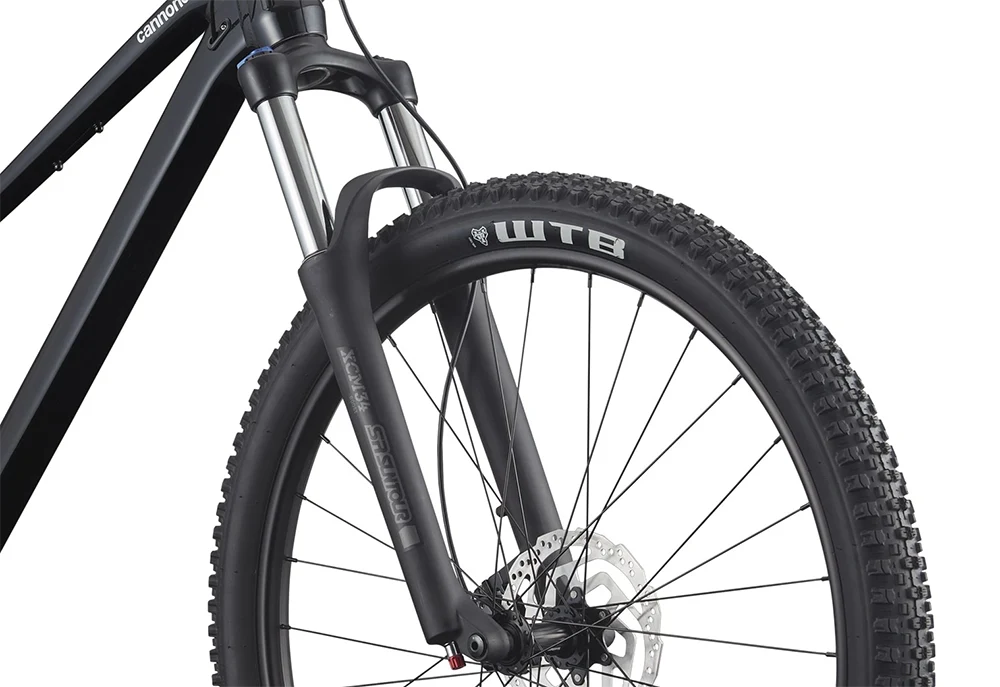
A suspension fork is one of the most important features of any hardtail mountain bicycle, improving grip, comfort, and control.
Most of the best hardtail mountain bikes come with front suspension, which makes it a crucial feature.
It helps absorb front-wheel impacts and improves grip, control, and comfort. The amount of fork travel varies based on the price and the bike’s intended use.
Cheap hardtails or cross-country-specific models typically have around 80-100 mm of travel. Trail-specific models usually have 120-140 mm for better control over more technical terrain.
Related: Complete Mountain Bike Suspension Guide
You’ll also see coil and air forks—air forks are lighter and more adjustable, whereas coil forks are more durable and comfortable, but heavier.
There are also hardtail MTBs with no suspension, called rigid mountain bikes. They are the lightest, but also the hardest to ride.
Wheel Size
Hardtails come with various wheel sizes, including 29″, 27.5″, and 26″ wheels (though these are rarer).
Smaller diameters, like 26″ and 27.5″ wheels, are more nimble and accelerate faster, whereas the larger 29″ wheels have better rollover performance, meaning they are better over rough terrain.
So choosing between 27.5″ and 29″ wheels boils down to your preferred style of riding. Also, keep in mind that many XS and S-sized hardtails come with 27.5-inch wheels only.
Drivetrain and Brakes
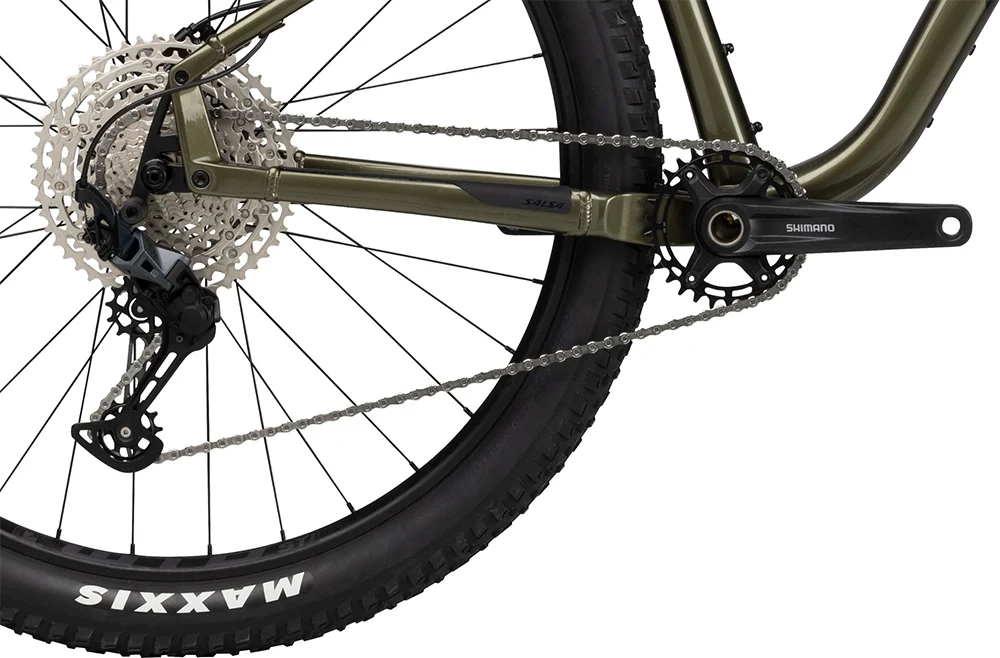
Most modern mountain bikes come with a 1x drivetrain and hydraulic or mechanical disc brakes, depending on the price point.
Most modern hardtails feature 1x drivetrains, which means that they have one chainring at the front, combined with a wide-range cassette in the rear. Therefore, more is not always better—a 1x drivetrain is simpler, more efficient, and easier to maintain.
When it comes to braking, disc brakes are the way to go. Hydraulic disc brakes offer more stopping power and control than mechanical disc brakes, especially on wet and muddy rides. They are also a lot easier to maintain and adjust.
Weight
Hardtails are typically lighter than comparable full-suspension mountain bikes because they lack a rear shock, linkage, pivots, and other associated parts.
Frame materials matter as well, so by getting a carbon fiber frame, you can save even more weight, which is especially important for avid climbers.
So if weight matters to you, aim to get a carbon hardtail mountain bike. We’ve included a few such models below, so feel free to take a look.
1. Giant Talon 29 1
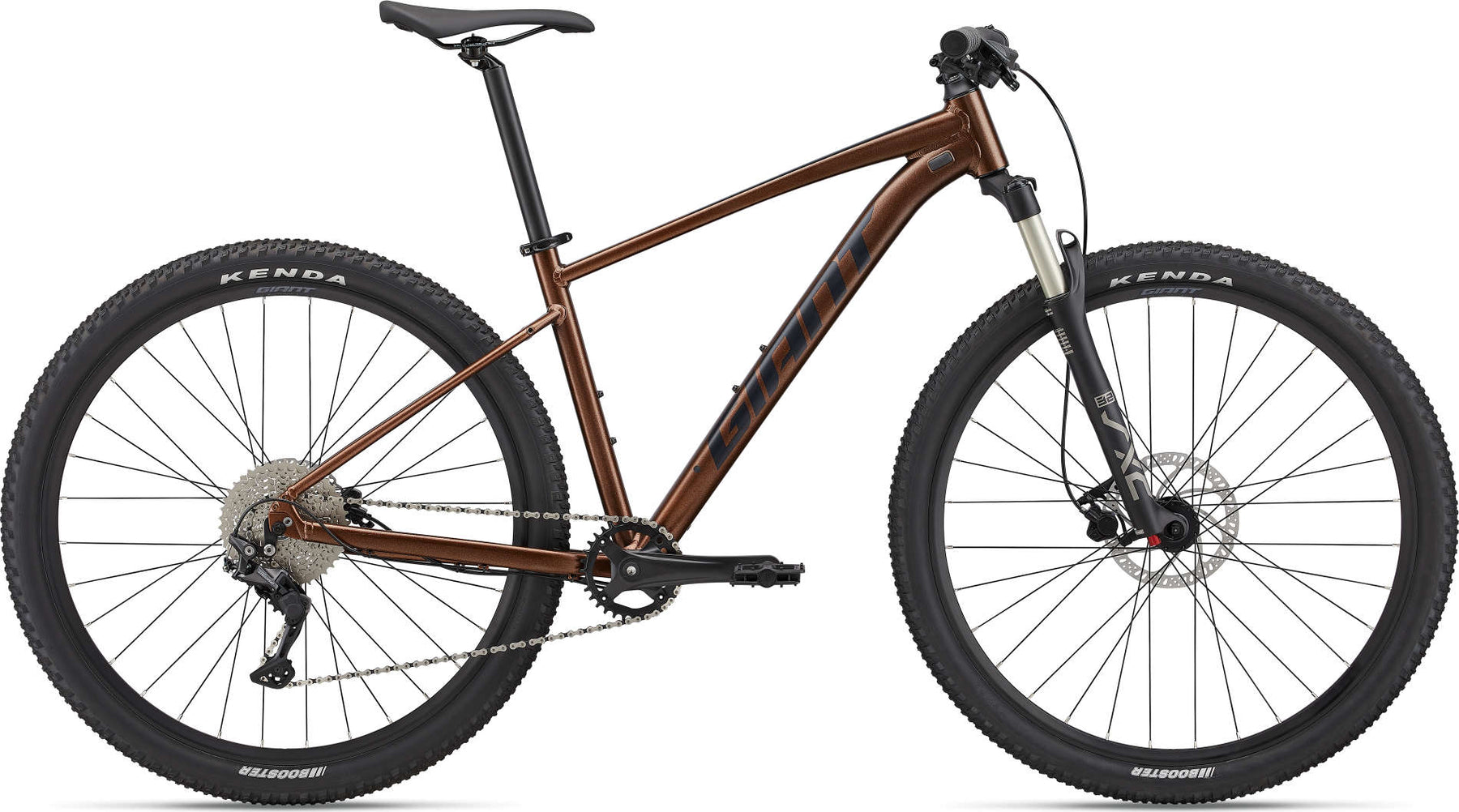
- MSRP: $900
- Frame: ALUXX Aluminum
- Fork: SXC32-2 RL, air spring, 80-100 mm
- Drivetrain: Shimano Deore 1×10
- Durable ALUXX aluminum frame
- Size-specific wheels and tires
- Size-specific air suspension travel
- Hydraulic brakes
- Deore groupset
- Heavy aluminum wheels
- 2.4″ maximum tire clearance
The Giant Talon 29 1 secured its place on our list thanks to a premium ALUXX aluminum frame and excellent components, making this bike a capable and durable option.
With 80-100 mm travel in the front, a slack head angle, and modern geometry, the Talon is about as playful and fast as they come for a 29er hardtail. Though, keep in mind that smaller frame sizes come with 27.5″ wheels and tires.
Modern trail geometry means you can tackle descents without a worry, as the air suspension will soak up the impacts and keep you rolling. A 10-speed Deore drivetrain keeps things light while providing a solid climbing gear ratio with 11-42t rear cogs.
Moreover, Tektro TDK143 hydraulic brakes and Giant’s double-wall aluminum wheels paired with Kenda Booster 2.4″ tires also add to this bike’s positive overall impression, even though they are entry-level parts.
With a decent build kit at an affordable price, the Talon 29 1 is an excellent choice for cyclists who want a lot of fun and trail readiness.
2. Cannondale Habit HT 3
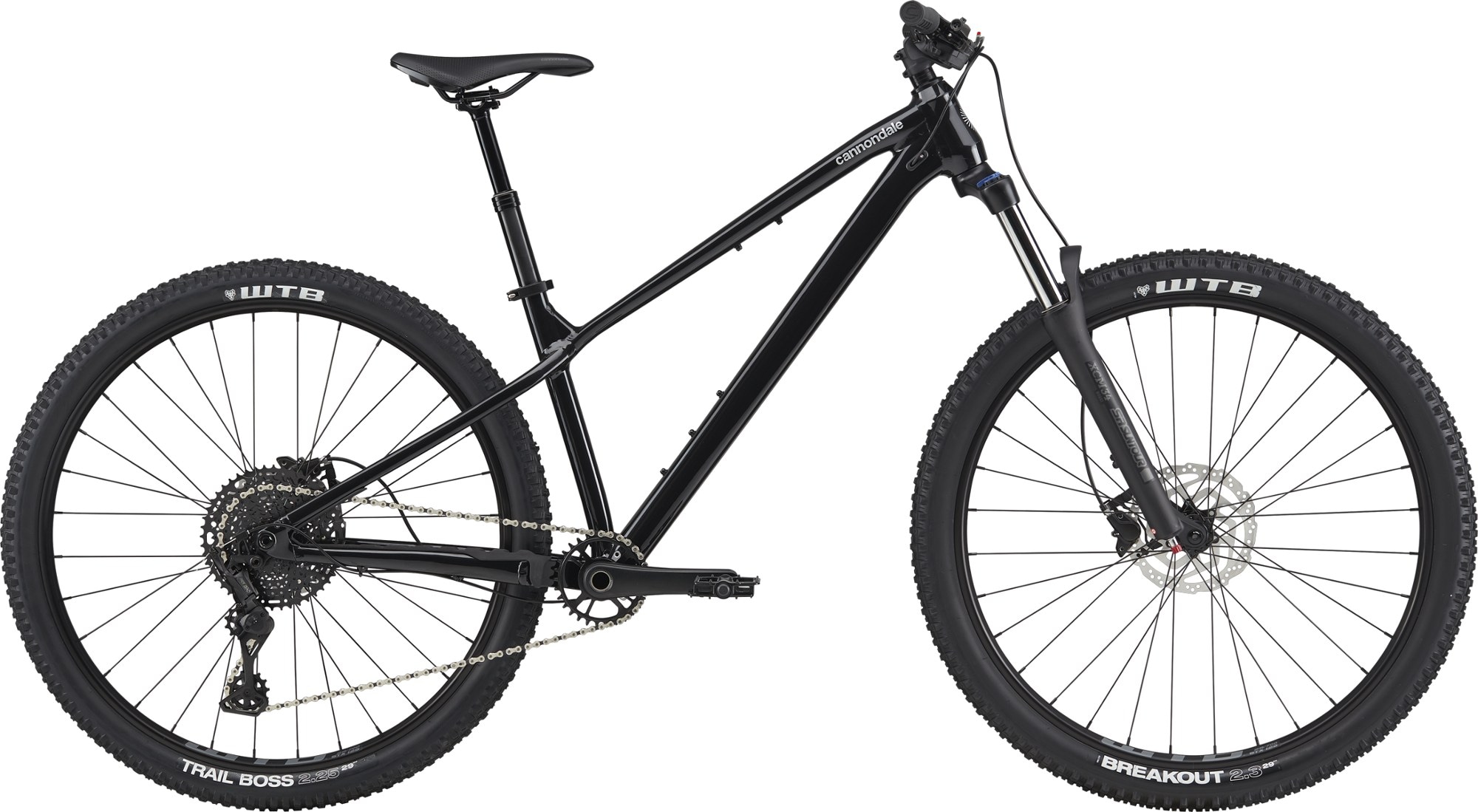
- MSRP: $1,100
- Frame: SmartForm C2 alloy
- Fork: SR Suntour XCR LO Boost 29, 130 mm
- Drivetrain: microSHIFT Advent X 1×10
- Slack trail geometry
- TranzX dropper seat post
- 130 mm suspension fork
- Attractive paint job
- StraightShot internal cable routing
- Entry-level MT200 brakes
The Cannondale Habit HT 3 is one of the best hardtail mountain bikes due to the high value for the money it offers, modern trail geometry, and Cannondale’s recognizable durability.
The bike features a well-thought-out frame design with a SmartForm C2 Alloy frame and StraightShot internal cable routing. Additionally, slack geometry and 2.3″ WTB Breakout tires offer excellent performance on diverse terrain.
Moreover, the Habit HT 3 also sports a wide-range 1×10-speed microShift Advent drivetrain and powerful Shimano MT200 hydraulic brakes that will help you successfully descend any trail.
Considering the $1,100 price tag, it’s surprising to see Cannondale also included a TranzX dropper seat post and a SR Suntour XCR LO Boost fork that delivers 130 mm of travel. Most riders will also love the sleek Black Pearl paint job that gives this bike a refined and more expensive appearance.
All in all, the Cannondale Habit HT 3 is a potent hardtail bike that offers near-full-suspension capabilities at a low price.
3. Salsa Rangefinder
- MSRP: $1,399
- Frame: 6061-T6 Aluminum
- Fork: SR Suntour XCR34 Boost, Air, 120 mm
- Drivetrain: Shimano Deore M6100 10-51T, 12-speed
- Deore M6100 12-speed drivetrain
- 27.5+ x 2.8″ tires
- TranzX dropper seat post
- Air suspension fork with 120 mm of travel
- Suitable for bikepacking
- Slightly too heavy
The Salsa Rangefinder is one of the best-selling hardtail mountain bikes under $1,500 and for a good reason.
The Rangefinder is a versatile option ideal for beginners and intermediate riders who wish to start exploring more trails and improving their mountain biking skills. Its aluminum alloy frame comes with a large number of mounting points, so this bike is also great for bikepacking adventures.
So, what makes the Rangefinder a bargain? We’d start by mentioning the SR Suntour XCR34 Boost Air suspension fork with 120 mm of travel and a Deore M6100 12-speed rear derailleur combined with a 10-51T cassette. This means you’ll be able to conquer any hill with ease if your legs are up to the task.
The Salsa Rangefinder also features 2-piston hydraulic brakes and a TranzX dropper seat post, both of which will help you improve your downhill game.
Finally, as a 27.5+ hardtail mountain bike, the Rangefinder rolls on Maxxis Rekon 27.5 x 2.8″ tires that offer ample amounts of grip in all conditions.
4. Santa Cruz Bicycles Chameleon 8
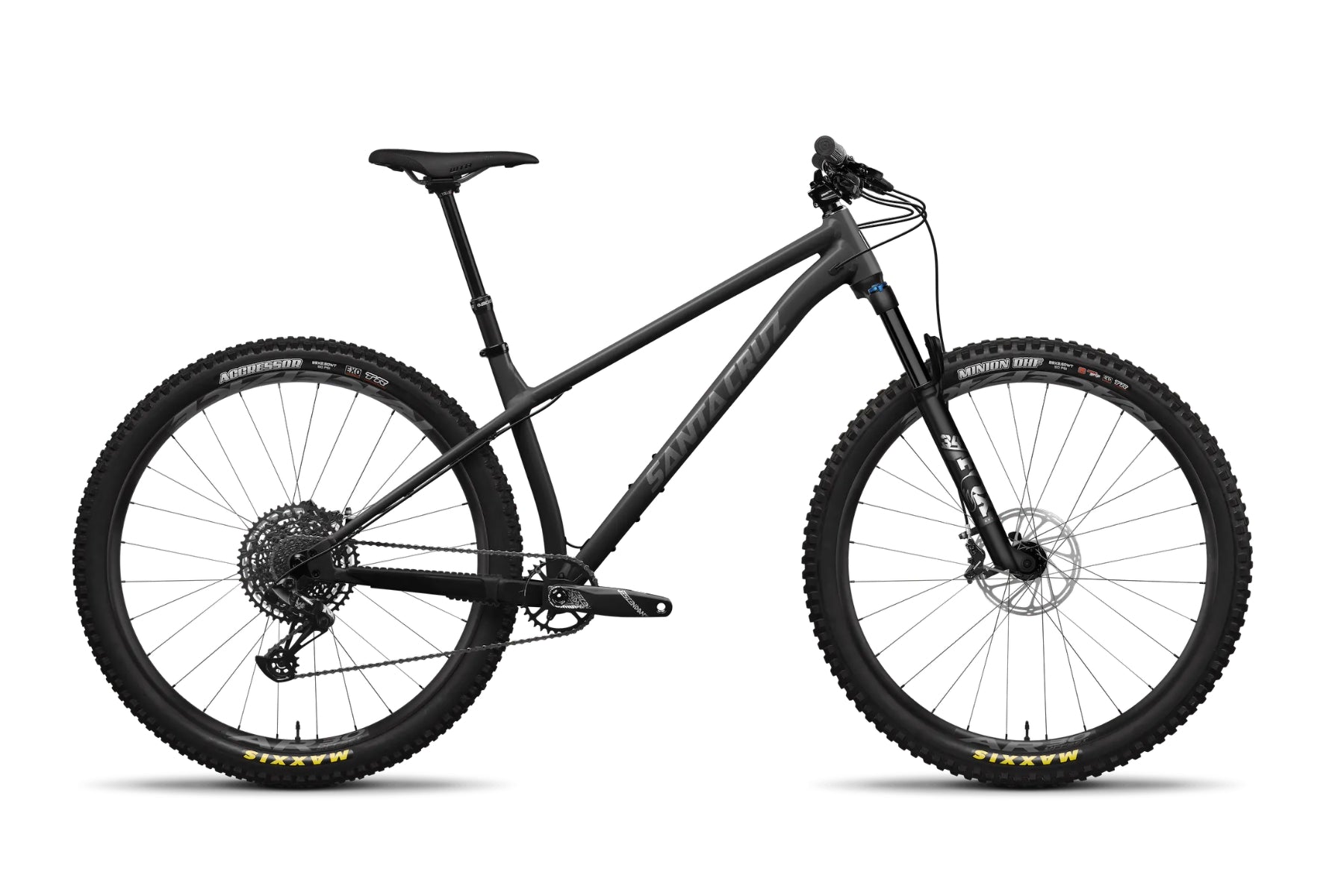
- MSRP: from $2,599 (Mike’s Bikes)
- Frame: Aluminum
- Fork: FOX Rhythm 34 Float, 130mm
- Drivetrain: SRAM NX Eagle 12-speed
- Smooth Fox suspension fork
- Wide-range SRAM NX Eagle drivetrain
- Powerful hydraulic brakes
- Internally routed dropper post
- Costly compared to other choices
The Santa Cruz Chameleon is a do-it-all hardtail mountain bike, which is probably where its name comes from.
This particular build comes with an aluminum frame and 29″ wheels, but you can also choose build kits with a carbon frame and 27.5-inch or mixed wheels. Therefore, the Chameleon can blend into any off-road environment.
The model we’re reviewing features a SRAM NX Eagle drivetrain with a wide-range 11-50T cassette and SRAM G2 R hydraulic disc brakes with 180 mm rotors. This is a capable mid-range list of components that offers good value for the money.
The 29″ wheel setup comes with Maxxis Aggressor 2.5″ wide tires, which means the Chameleon has excellent rollover capabilities and it maintains momentum well on rough sections of the trail.
Santa Cruz also equipped this model with a FOX Rhythm 34 Float fork with 130mm of travel and an SDG Tellis Dropper post, so you can feel confident diving into most descents.
5. Co-op Cycles DRT 1.3
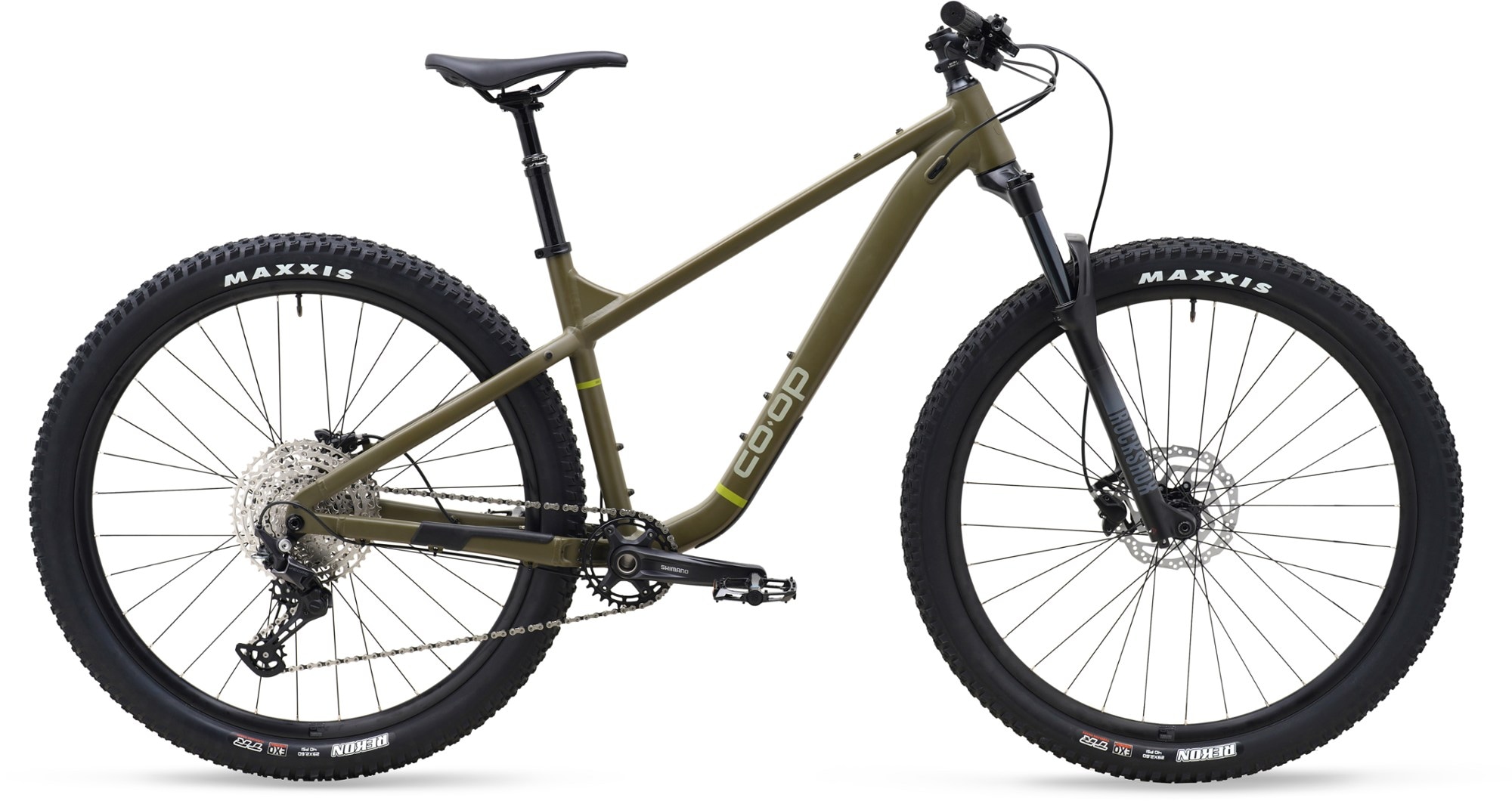
- MSRP: $1,399
- Frame: Aluminum
- Fork: RockShox Judy Silver TK Solo Air, 120 mm
- Drivetrain: Shimano Deore 12-speed 10-51T
- Size-specific wheelset
- Lots of mounting points
- New Deore 12-speed drivetrain
- TranzX dropper post
- A bit heavy
- Dull paint job
The Co-op Cycles DRT 1.3 is hands down one of the most fun aluminum hardtail mountain bikes in its price range.
The DRT 1.3 is a trail ripper that suits beginners and intermediate riders on a budget thanks to its modern trail geometry and well-balanced mid-range components.
It’s built around an aluminum frame with size-specific wheels (27.5″ or 29″) and a tried and true RockShox Judy Silver Air fork with 120 mm of travel.
The Co-op Cycles DRT 1.3 also comes with a Deore 12-speed drivetrain that is reliable and has plenty of gearing for steep climbs due to a 10-51T cassette. On top of that, the 27.5″ (or 29″) wheels and 2.4″ tires provide extra stability and grip.
Other highlights include entry-level Shimano MT200 hydraulic brakes, a TranzX dropper post, and plenty of mounts to attach water bottles, frame bags, and even a rear rack for bikepacking trips.
Check out our full review of the Co-op Cycles DRT series to find out about other models in the lineup as well.
6. Specialized Chisel
- MSRP: $1,800
- Frame: Aluminum alloy
- Fork: RockShox Judy Silver, 100 mm
- Drivetrain: SRAM SX Eagle, 12-speed
- Progressive XC Geometry
- Excellent SRAM drivetrain
- Hookless, tubeless-ready wheels
- Attractive overall design
- No dropper post
- A bit expensive
The Specialized Chisel is an excellent hardtail mountain bike for intermediate cyclists seeking to take their skills to the next level and build more confidence on rougher singletrack trails.
The Chisel is built around Specialized’s D’Aluisio Smartweld M5 alloy with hydroformed tubes and progressive XC geometry. It rocks a RockShox Judy Silver air fork with 100 mm of travel, so it’s intended for fast and flowy trails that require lots of pedaling.
The Chisel also comes with a SRAM SX Eagle 12-Speed drivetrain that’s notably durable and has reliable shifting and also boasts SRAM Level T hydraulic disc brakes with 2-piston calipers.
What we also like about this bike is the versatile Specialized Fast Trak 29″ x 2.35″ tires and two attractive paint jobs that most mountain bikes will easily fall in love with.
To sum up, the Specialized Chisel may be slightly more expensive than the similarly equipped competition, but it has Specialized’s high-quality build and attention to detail that make it a worthy contender on this list.
7. Santa Cruz Highball 3.1

- MSRP: $3,999
- Frame: Carbon C
- Fork: RockShox SID SL Select+, 100mm w/Remote
- Drivetrain: SRAM GX Eagle, 12-Speed
- Lightweight frame build
- Race-ready build
- Tubeless-ready rims and tires
- Excellent drivetrain and brakes
- XC-only geometry
The Santa Cruz Highball 3.1 is the perfect example of what a highly capable hardtail XC bike should look like, which is lightweight, fast, and ready for rough races.
The Highball 3.1 model we’re reviewing here is Santa Cruz’s flagship model that uses a lightweight and stiff Carbon C frameset and a responsive RockShox SID SL Select+ suspension fork with 100 mm of travel. That makes it a great choice for long climbs and long days in the saddle.
This hardtail rolls on 29″ x 2.35″ tires that roll over rocks and roots with ease, but there’s enough clearance to go slightly wider, up to 2.4″. Both the rims and tires are tubeless-ready, so you’ll get fewer flats and snake bites.
The Santa Cruz Highball 3.1 also features a SRAM GX Eagle 12-speed drivetrain paired with SRAM Level hydraulic disc brakes that provide plenty of stopping power to control your descents.
All in all, the Highball is pricey, but if you’re a rider who’s ready to race or kick their skills up a notch, this modern hardtail is worth splurging on.
8. Orbea Laufey H30

- MSRP: $1,899
- Frame: Aluminum
- Fork: RockShox Rekon RL, 140 mm
- Drivetrain: Shimano Deore, 12-speed
- Lightweight Aluminum frame
- 140 mm of front suspension travel
- Tubeless-ready rims and tires
- Efficient XC-race geometry
- Shimano Deore 12-speed drivetrain
- Heavy aluminum wheels
If your ideal day on the trails includes lots of pedaling, climbing, pushing over rolling hills, and racing to the finish line, the Orbea Laufey H30 will make you perfectly happy.
This is a lightweight aluminum hardtail mountain bike that boasts Orbea’s hydroformed triple butted alloy and a RockShox Rekon RL fork with 140 mm of travel.
The frame also comes with full internal cable routing, an integrated chainstay protector, front and rear Boost hubs, and ISCG-05 tabs. Plus, the fork comes with a lock out feature, so you can climb more efficiently.
The list of components includes a Shimano Deore drivetrain with a 12-speed rear derailleur and Shimano MT201 hydraulic disc brakes. Moreover, the Laufey H30 rolls on Maxxis Dissector 29 x 2.6″ tubeless-ready tires, so you can say goodbye to pesky flats.
All things considered, we recommend buying the Orbea Laufey H30 if you have a limited budget and you’re looking for a serious aluminum hardtail XC race bike.
9. Marin San Quentin 2

- MSRP: $1,399
- Frame: Series 3 6061 aluminum
- Fork: RockShox FS 35 Silver, 140mm
- Drivetrain: Shimano Deore 11-Speed
- Durable and comfortable aluminum frame
- High-quality RockShox FS 35 Silver 140 mm fork
- Shimano hydraulic disc brakes
- Wide-range cassette and Deore groupset
- Heavy-ish Marin aluminum wheels
Marin San Quentin 2 is a unique choice on this list considering it has a dirt jump aluminum frame with great components. This makes it an ideal option for pump tracks and flowy trails.
This model features a RockShox FS 35 Silver fork with 140 mm of travel and compression/rebound adjustments. Moreover, it comes equipped with a durable Deore 1×11 drivetrain and a wide range 11-51T cassette, so you’ll be able to climb hills even when fully loaded.
Of course, high-quality Shimano 2-piston (front and rear) disc brakes are part of the spec list as well, meaning you can slow down or stop with confidence.
The aluminum double-wall rims are tubeless-ready, so if you pair them with compatible tires, you can go fully tubeless and prevent flats and snake bite punctures. This is a great feature to have on trails, as it allows you to ride more and deal with technical failures less.
So if you want more adventures in your life and you need the right companion for them, we recommend choosing the Marin San Quentin 2.
10. Niner AIR 9 2-Star
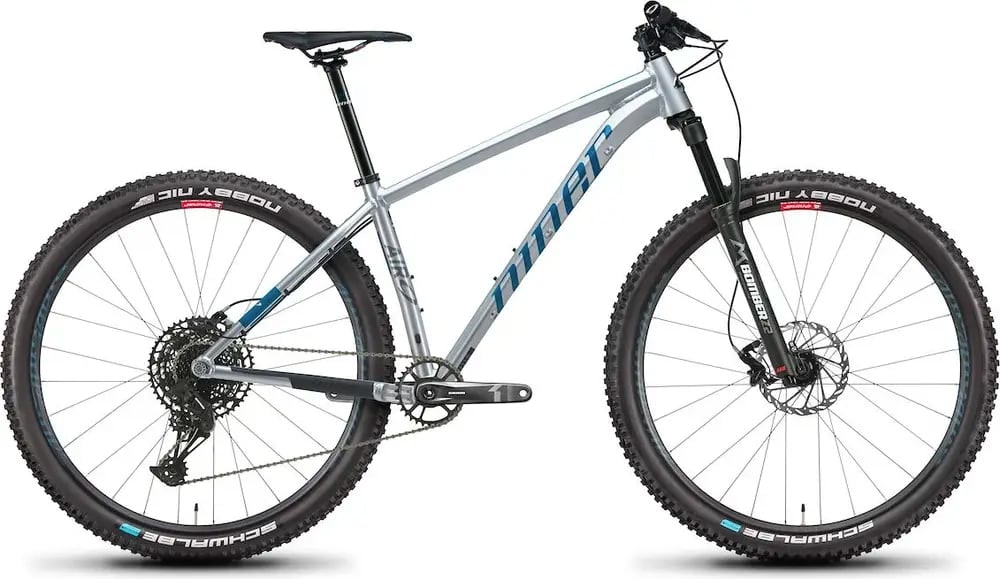
- MSRP: $1,999
- Frame: Hydroformed aluminum frame
- Fork: Marzocchi Bomber Z2 Rail 120 mm
- Drivetrain: SRAM SX Eagle 12-speed
- Modern XC trail geometry
- Lightweight aluminum frame
- Versatile 120 mm of suspension
- Wide-range SRAM Eagle drivetrain
- Tubeless-ready rims and tires
- No dropper post
The Niner AIR 9 2-Star is a lightweight, responsive hardtail built around a hydroformed aluminum frame with extra tire clearance and Niner’s Trail Country geometry.
Niner has been putting out bikes for serious XC riders for quite a while now, and this bike is no exception. An SRAM SX Eagle groupset shifts reliably and smoothly between gears. Tubeless-ready rims and tires make for a more durable and comfortable ride, with clearance for a 29 x 2.4″ or 27.5 x 3.0″ setup.
The Marzocchi Bomber Z2 Rail 120 mm fork suspension provides plenty of absorption for rolling XC trails, and Schwalbe Nobby Nic 2.6″ and 2.35″ tires balance traction and fast rolling. On top of that, the Niner Air 9 also comes with SRAM Level hydraulic disc brakes that stop on a dime and require minimal maintenance.
So if you’re a new mountain biker looking to experience the trails, the Niner AIR 9 2-Star build is a great contender.
11. Aventon Ramblas Ebike
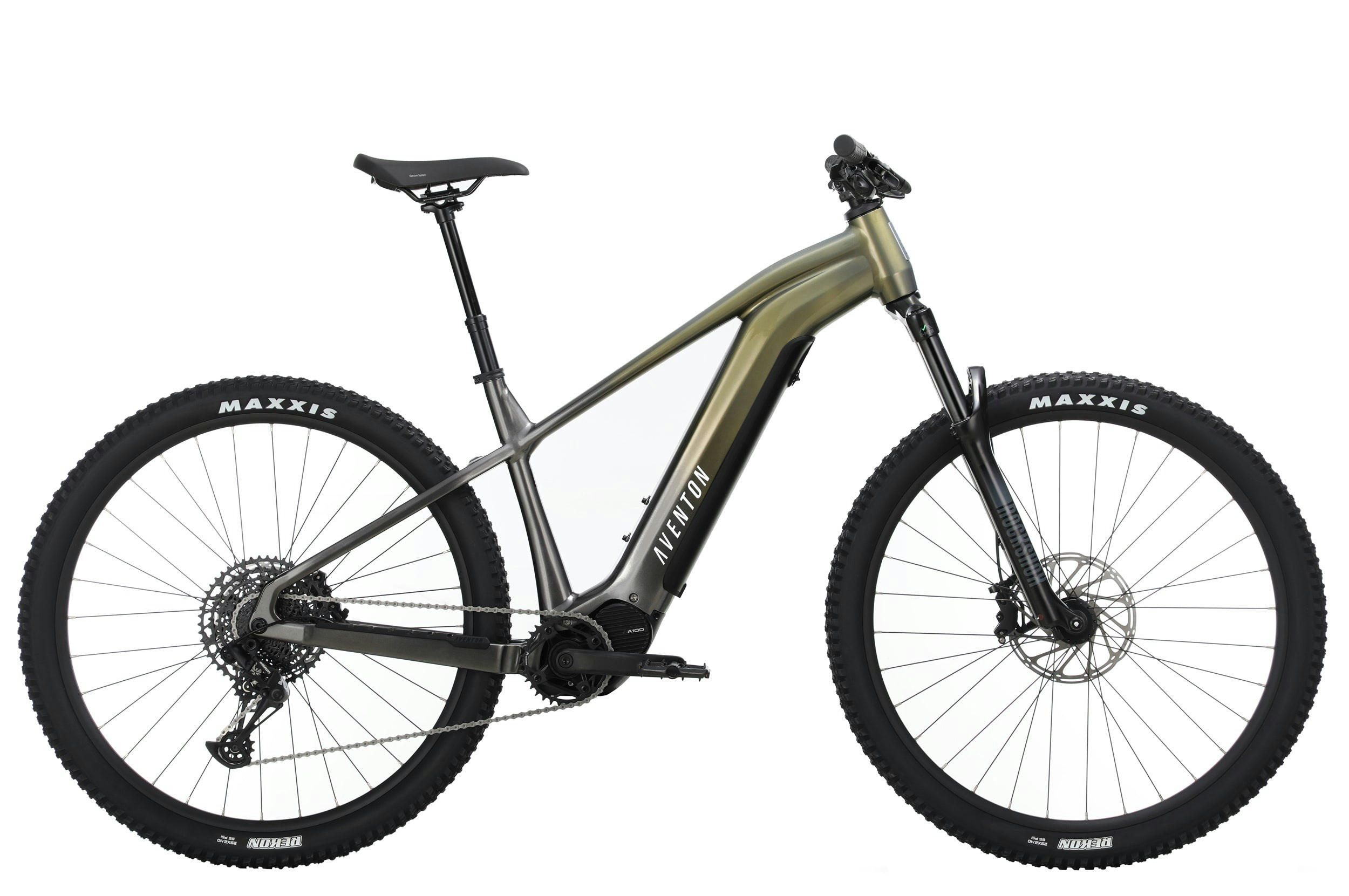
- MSRP: $2,699
- Frame: 6061 aluminum frame
- Fork: RockShox 35 Silver R 130mm travel
- Drivetrain: SRAM NX Eagle 12-speed
- Dropper post
- Wide-range SRAM NX groupset
- 4-piston hydraulic disc brakes
- RockShox front suspension
- Rims are not tubeless-ready
Whether you’re an aspiring amateur or an experienced XC rider, the Aventon Ramblas e-bike packs many desirable features for those trying to up their game.
This is a brand-new ebike from Aventon, boasting a 100 Nm mid-drive motor and a 708 Wh battery. What this means is that you’ll be able to climb steep sections of the trail with ease and ride up to 80 miles before you have to recharge the battery again.
The 6061 aluminum frame is lightweight and responsive with a trail-specific design. The Ramblas comes with tons of modern touches like a 1×12 SRAM NX Eagle drivetrain, grippy Maxxis Rekon 2.4″ tires, quality SRAM DB8 4-piston hydraulic brakes, and a dropper post.
The front fork is a moderate-travel RockShox 35 Silver R with 120 mm of travel, rounding out the bike’s performance on downhill sections and drops. This is a fork that we often see on similarly priced bikes in this category, so you’re getting good value for the money.
The only disadvantage of this bike is the fact that the wheels are not tubeless-ready, so you’ll need to upgrade them if you want to run a tubeless setup. However, if you don’t mind this, the rest of the build is very well-balanced.
So if you’re looking for one of the best reasonably priced electric hardtail mountain bikes for recreational riders, the Aventon Ramblas is a great choice.
12. Liv Tempt 1 29
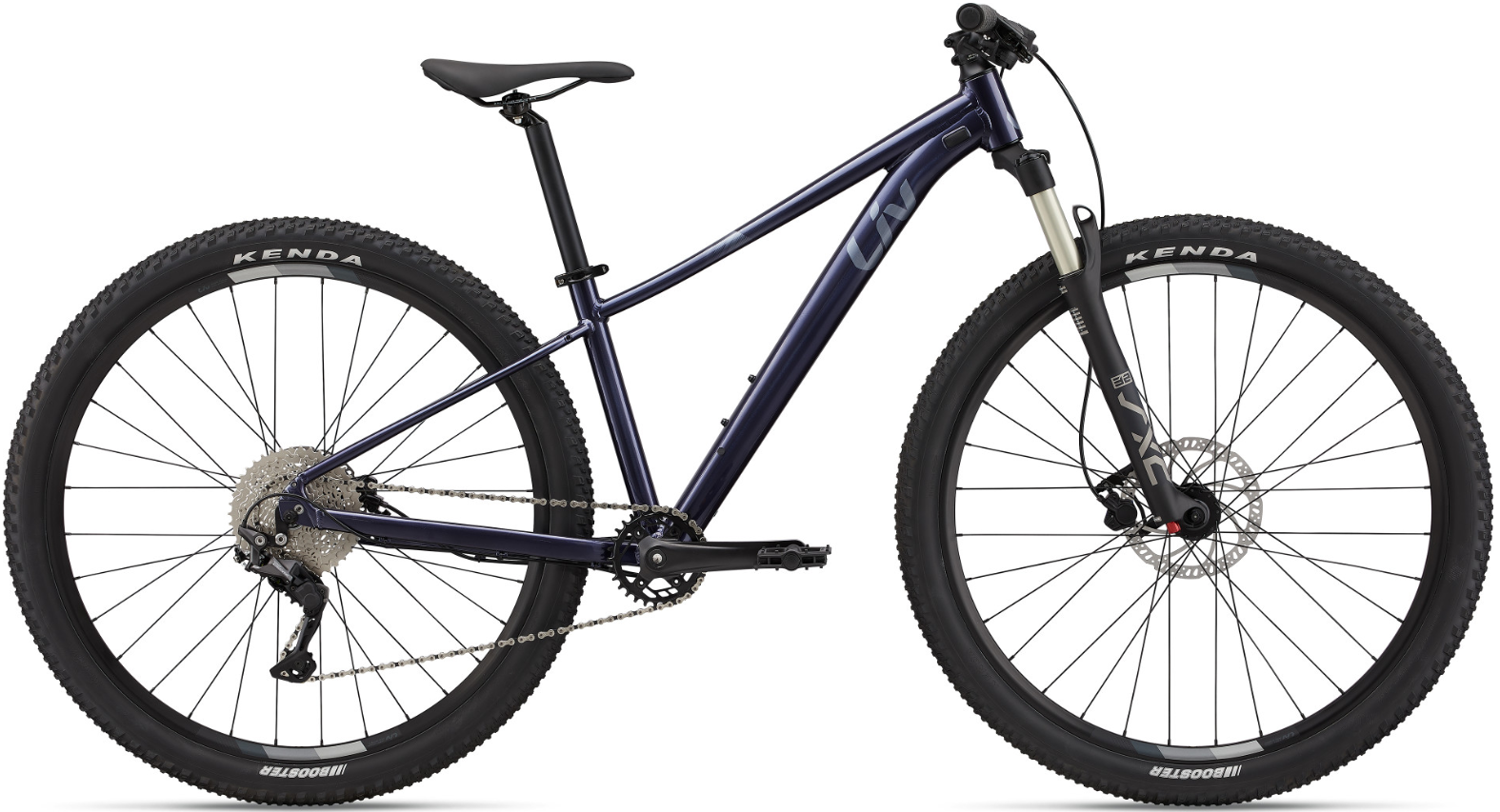
- MSRP: $950
- Frame: 6061 Alloy Aluminum
- Fork: 80-100 mm air spring
- Drivetrain: Shimano Deore 1×10
- Modern slack geometry
- Frame-specific travel suspension fork
- 29er wheels and tires
- Wide-range drivetrain
- Hydraulic disc brakes
- One water bottle cage mount
The Liv Cycles Tempt 1 is an women’s hardtail trail bike aimed at riders who ride hard on rough terrain.
The alloy frame is built with modern trail geometry to provide stability on rough descents as well as a comfortable climbing position. This modern slack geometry is combined with an 80-100 air suspension fork, giving the Tempt 1 excellent rollover capabilities.
Other excellent features include Kenda Booste 29 x 2.4″ tires and a 10-speed Shimano Deore rear derailleur with a clutch.
The Tempt 1 also comes with powerful hydraulic disc brakes, but unfortunately doesn’t feature a dropper post.
This Liv bike is a great fit for trail fanatics and those who need a women-specific machine to match their skill level. If you want a capable hardtail bike that will push you to develop better off-road riding skills, the Liv Tempt 1 is the one.
13. Ibis DV9 NGX

- MSRP: $3,499
- Frame: Carbon fiber frame
- Fork: Fox Float 34 Performance, 120 mm
- Drivetrain: SRAM GX Eagle, 12-Speed
- Lightweight and stiff carbon frame
- Versatile trail and XC geometry
- Dropper seat post
- Tubeless-ready setup
- Integrated frame protection and chainstay protection
- Pricey for a hardtail
The Ibis DV9 NGX is a demonstration of the brand’s keen eye for design and commitment to impeccable quality. This bike offers solid components for the price and a premium carbon frame designed to maximize strength and performance while minimizing weight.
The DV9 is a lightweight carbon do-anything, go-anywhere hardtail that is perfect for recreational trail riding, as well as for XC racing. It has high-quality components such as a SRAM NX/GX Eagle drivetrain that performs well in various conditions, including in demanding races.
Moreover, the Deore M6100 hydraulic disc brakes with 180/160mm rotors ensure you’ll be able to descend with confidence, along with a KS Rage-i Dropper seat post.
The Ibis DV9 rolls on excellent Maxxis Recon Race 29 x 2.4″ tires that are tubeless-ready, so you can expect fewer flats. This also means you can lower the tire pressure if needed to gain an advantage in a race by improving grip and traction.
All things considered, if you have the budget, there are few options on this list that are as refined and as versatile as the Ibis DV9 NGX.
Other Things You Need to Know About Hardtail Mountain Bikes
Hardtail Mountain Bike Geometry
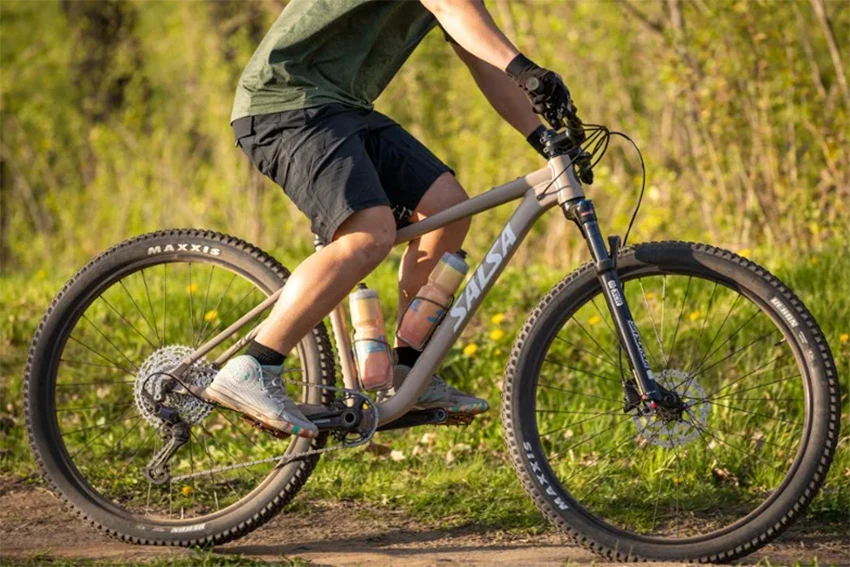
Hardtail MTBs generally have a more upright geometry that favorizes pedaling and climbing, just like the Salsa Rangefinder pictured above.
Most hardtail mountain bikes are associated with traditional mountain biking geometry.
This means a shorter reach, a steeper head tube and seat tube angle, and a more upright riding position. This is great for climbing and pedaling, but not ideal for storming chunky descents and rock gardens.
However, newer models come with modern geometry that emphasizes a longer reach, short chainstays, slacker head tube angle, and a balanced seat tube angle. As a consequence, these bikes offer a better blend of climbing proficiency and descending capabilities.
Want to learn more about why all these angles matter? Read our full bike geometry guide.
Is a Dropper Post Worth It?
You’ll see that the best hardtail mountain bikes listed above come with a dropper seat post. Why is that?
Well, a dropper post is always a good addition to a hardtail because it helps you transfer your weight over the rear end of the bike, which is important for better control while descending.
A dropper post can be a game-changer on a hardtail MTB, improving control and performance on steep descents.
We’d say it’s even more important than on a full-suspension mountain bike, considering the hardtail’s stiff rear end.
Therefore, if your budget allows it, a dropper post is definitely worth it.
Hardtail Mountain Bike Maintenance and Durability
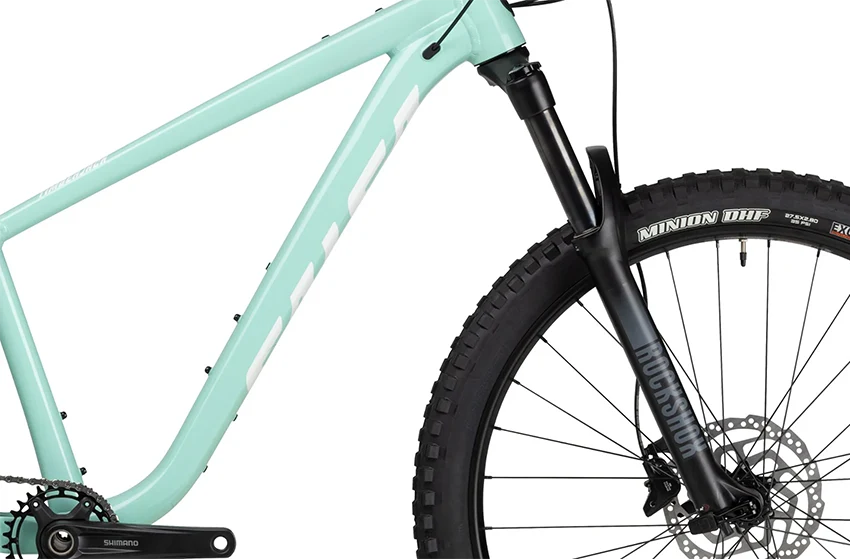
Hardtail mountain bicycles are easy to maintain and generally last longer because of fewer moving parts.
The Hardtail mountain bike is famous for its simplicity and ease of maintenance, especially compared to dual-suspension bikes.
The lack of rear suspension reduces the number of moving parts, most of which require regular maintenance such as lubrication and replacement of pivot bearings.
This simplicity also means you’ll have less frequent tune-ups and repairs, which adds up in time and money spent over time.
As a result, hardtails tend to be more durable in the long run, thanks to having fewer moving parts that are susceptible to wear and tear.
So if you’re a set-it-and-forget-it type of rider and you’re looking for a robust, low-maintenance option, a hardtail is the way to go.
Conclusion: Is a Hardtail Right for You?
In conclusion, hardtail mountain bikes are simple, efficient, and provide a high value for the money. They can be a good choice both for beginners and for avid mountain bikers.
A hardtail will allow you to develop a better riding technique before switching to a full-suspension bike, so it’s the right choice if you’re new to the mountain biking world.
But, ultimately, choosing a hardtail mountain bike boils down to budget and riding style.
Considering all of this, if you think that a hardtail is the right choice for you, our list above offers a good variety of models available, from budget-friendly options to high-end carbon builds, ensuring there’s a hardtail for every rider and every terrain.



